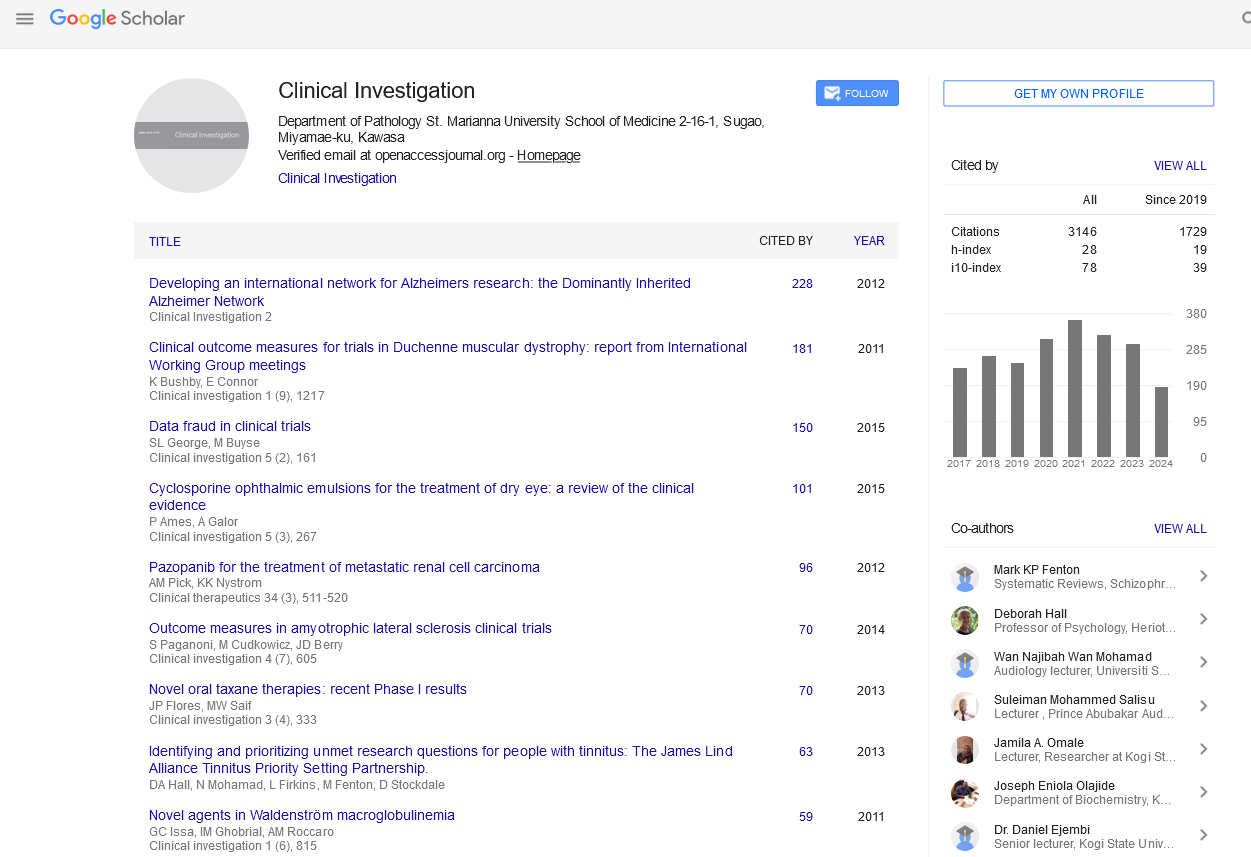Opinion Article - Clinical Investigation (2024) Volume 14, Issue 3
Future Clinical Trials: Shaping the Next Generation of Medical Research
- Corresponding Author:
- Isika Enn
Faculty of Biology, Kyoto University, Japan
E-mail: isikaenn@gmail.com
Received: 2-Mar-2024, Manuscript No. fmci-25-160262; Editor assigned: 5-Mar-2024, PreQC No. fmci-25-160262(PQ); Reviewed: 13-Mar-2024, QC No. fmci-25-160262(Q); Revised: 21-Mar-2024, Manuscript No. fmci-25-160262(R); Published: 26-Mar-2024
Abstract
The landscape of clinical trials is undergoing significant transformation, driven by technological advancements, evolving regulatory frameworks, and the growing need for personalized, patient-centered treatments. The future of clinical trials holds immense promise, as new methodologies, such as decentralized trials, Artificial Intelligence (AI), and adaptive trial designs, are reshaping how clinical research is conducted. This article explores these emerging trends, the challenges they present, and their potential to revolutionize medical research and improve patient outcomes. By embracing these innovations, the clinical trial process will become more efficient, inclusive, and capable of addressing the ever-growing demands of modern healthcare.
Keywords
Future clinical trials • Decentralized trials • Artificial intelligence • Adaptive trials • Personalized medicine • Medical research • Patient-Centered care • Healthcare innovation
Introduction
Clinical trials are fundamental to advancing medical knowledge, developing new treatments, and improving patient care. Over the past several decades, clinical trials have become increasingly sophisticated, with a focus on rigorous testing of drugs, medical devices, and interventions to ensure safety and efficacy.
As healthcare continues to evolve, there is a growing demand for more efficient, patient-friendly, and adaptive methods to conduct clinical trials. The future of clinical trials is being shaped by technological innovations, such as Artificial Intelligence (AI), realtime data monitoring, and decentralized trials, which promise to make trials more accessible, faster, and more personalized. These innovations also present an opportunity to address longstanding issues like patient recruitment, trial design limitations, and regulatory constraints.
This article delves into the future of clinical trials, focusing on the emerging trends and technologies that are likely to revolutionize the field. It explores Decentralized Clinical Trials (DCTs), the integration of AI in trial design and data analysis, and the role of adaptive trials in improving trial efficiency. It also discusses the ethical, logistical, and regulatory challenges that must be navigated to realize the full potential of these future trials.
Emerging Trends in Future Clinical Trials
• Decentralized Clinical Trials (DCTs):Decentralized clinical trials are one of the most promising innovations in the future of clinical trials. DCTs leverage digital health technologies, such as telemedicine, wearable devices, and mobile apps, to conduct trials remotely, often eliminating the need for patients to travel to central trial sites. This approach not only improves patient convenience but also has the potential to reach a broader and more diverse population, including those in rural or underserved areas. DCTs are particularly well-suited for chronic disease management, as they allow for continuous monitoring of patients in their natural environments. Real-time data collection through wearable devices and mobile apps enhances the ability to track health metrics and adjust treatment plans accordingly. By reducing logistical barriers and costs, DCTs can increase patient enrollment and retention, speeding up the clinical trial process
• Artificial Intelligence (AI):Artificial intelligence is rapidly transforming clinical research by enabling faster and more accurate data analysis, optimizing trial designs, and predicting patient outcomes. AI can help identify potential candidates for trials by analyzing vast datasets, such as Electronic Health Records (EHRs), and selecting participants based on specific genetic or clinical criteria. This process, known as "precision recruitment," improves the likelihood of identifying patients who will benefit most from the intervention being tested. In addition to recruitment, AI can play a crucial role in analyzing trial data in realtime, detecting patterns, and predicting adverse events or treatment responses. Machine learning algorithms can also optimize trial designs by suggesting which variables to test, determining the most effective dose, or identifying subgroups of patients who may respond better to certain treatments. AI-powered tools can help streamline the clinical trial process, making it more efficient and cost-effective.
• Adaptive Trials:Adaptive trials are an innovative approach to clinical trial design that allows for modifications to the trial protocol based on interim data analysis. This flexibility enables researchers to make real-time adjustments to the trial, such as changing the treatment dose, altering the patient population, or halting the trial if the treatment shows insufficient efficacy or an unacceptable safety profile. The adaptive trial model not only speeds up the clinical trial process but also increases its efficiency by reducing the number of patients needed to draw valid conclusions. This approach is especially useful in fields like oncology, where the efficacy of treatments can vary widely between patients. By allowing researchers to adjust the trial based on early results, adaptive trials hold the potential to shorten development timelines and bring new therapies to market faster.
• Patient-Centered Trials:The future of clinical trials will place a stronger emphasis on patient-centered care, where patients are actively involved in the design and execution of the trials. This approach prioritizes the needs and preferences of patients, ensuring that trials are designed with their well-being in mind. Personalized medicine, which tailors treatments to the genetic, environmental, and lifestyle factors of individual patients, will become a key focus in future trials. Moreover, the use of mobile health apps and telemedicine can help engage patients more effectively throughout the trial process. By incorporating patient feedback, ensuring greater transparency, and providing more flexible participation options, patient-centered trials will foster greater trust in the clinical trial process and increase patient retention rates.
• Regulatory evolution and digital platforms: As clinical trials become more complex and technology-driven, regulatory frameworks will need to evolve to accommodate new methodologies. Regulatory bodies, such as the U.S. Food and Drug Administration (FDA) and the European Medicines Agency (EMA), are already adapting to the rise of DCTs, adaptive trials, and AI in clinical research. Digital platforms that support data sharing, electronic informed consent, and remote monitoring will also play an increasingly important role in clinical trials. These platforms can help streamline regulatory compliance, improve trial oversight, and enable more efficient data management. Additionally, the use of blockchain technology could enhance data security and integrity, ensuring that trial data is transparent, verifiable, and tamper-proof.
Challenges to overcome
Despite the immense potential of future clinical trials, several challenges must be addressed to fully realize these innovations.
• Data privacy and security: The integration of digital health technologies and AI in clinical trials raises concerns about data privacy and security. As trials collect more sensitive health data remotely, it is crucial to ensure that patient information is protected from cyber threats and breaches. Strong data protection policies and encryption methods will be essential to maintaining patient trust and regulatory compliance.
• Regulatory Hurdles: While regulatory bodies are beginning to adapt to new trial methodologies, there is still a need for more streamlined and flexible regulatory processes to accommodate the rise of decentralized trials and adaptive designs. Regulators will need to ensure that new approaches maintain patient safety while encouraging innovation.
• Patient Engagement: Ensuring broad participation in clinical trials is a key challenge, particularly for marginalized or underserved populations. Although decentralized trials make participation more convenient, patient engagement remains a significant hurdle. Addressing concerns about data privacy, providing incentives, and offering more flexible trial designs will be necessary to increase patient participation rates.
• Integration of New Technologies: As clinical trials increasingly rely on AI, remote monitoring, and digital tools, there will be a need for standardized systems to integrate these technologies into the trial process. Ensuring that new platforms are compatible with existing infrastructures and workflows will be crucial for achieving efficiency and minimizing disruptions.
Conclusion
The future of clinical trials is bright, driven by technological innovations that promise to make trials more efficient, patient-friendly, and inclusive. Decentralized trials, AI-driven recruitment and data analysis, adaptive designs, and a stronger emphasis on patient-centered care are all set to revolutionize the clinical research landscape. These innovations offer the potential to accelerate the development of new treatments, improve patient outcomes, and reduce the costs associated with clinical trials.
However, to fully realize the benefits of future trials, stakeholders must address key challenges related to data security, regulatory frameworks, patient engagement, and the integration of new technologies. By overcoming these hurdles, the clinical trial process will become more streamlined, efficient, and accessible, ultimately bringing us closer to a future where new, effective treatments can be delivered to patients faster and with greater precision.
As we look ahead, it is clear that the future of clinical trials will be shaped by continued collaboration between researchers, patients, regulators, and technology developers. With ongoing innovation and a focus on patient needs, the next generation of clinical trials has the potential to redefine the way we approach healthcare and medical research.


